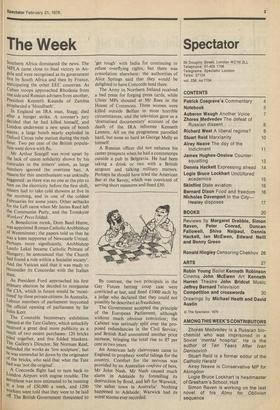The Week
Southern Africa dominated the news. The NIPLA came close to final victory in Angola and were recognised as its government first by South Africa and then by France, anticipating the other EEC countries. As Cuban troops approached Rhodesia from one side and Russian advisers from another, President Kenneth Kaunda of Zambia Prophesied a 'bloodbath'.
In England an IRA man, Stagg, died after a hunger strike. A coroner's jury decided that he had killed himself, and London underwent a new spate of bomb scares; a large bomb nearly exploded in Oxford Circus tube station during the rush hour. Two per cent of the British population went down with flu.
Mr Arthur Scargill was most upset by the lack of union solidarity shown by his comrades in the miners' union, as large numbers ignored the overtime ban. A reason for this unenthusiasm was unkindly suggested: as there was no one at the pits to turn on the electricity before the first shift, miners had to take cold showers at five in the morning, and in one of the coldest Februaries for some years. Other setbacks for the Left came when Mr James Reed left the Communist Party, and the Trotskyist Workers' Press folded.
A Benedictine monk, Dom Basil Hume, Was appointed Roman Catholic Archbishop of Westminster; the papers told us that he Was a keen supporter of Newcastle United. Perhaps more significantly, Archbishop Laszlo Lekai became Catholic Primate of Hungary; he announced that 'the Church had found a role within a Socialist society'.
And the Vatican said that it was ready to reconsider its Concordat with the Italian state.
As President Ford approached his first Primary election he decided to reorganise the CIA, which in future would be 'monitored' by three private citizens. In Australia, Labour members of parliament boycotted the official opening of parliament by Sir John Kerr.
The Constable bicentenary exhibition oPened at the Tate Gallery, which unluckily received a great deal more publicity as a result of two recent purchases: 120 bricks Piled together, and five folded blankets. The Gallery's Director, Sir Norman Reid, defended the works as 'low sculpture', but he was somewhat let down by the originator Of the bricks, who said that what the Tate had was 'not the original'.
A Concorde flight had to turn back to London Airport with engine trouble. The
aeroplane was now estimated to be running at a loss of 00,000 a week, and 1200 Workers were told that they were to be laid °ff. The British Government threatened to 'get tough' with India for continuing to refuse overflying rights, but there was consolation elsewhere: the authorities of Alice Springs said that they would be delighted to have Concorde land there.
The Army in Northern Ireland received a bad press for forging press cards, while Ulster MPs shouted at Mr Rees in the House of Commons. Three women were killed outside Belfast in most horrible circumstances, ahd the television gave us a 'dramatised documentary' account of the death of the IRA informer Kenneth Lennon. All on the programme parodied hard, but none so hard as George Melly as himself.
A Russian officer did not enhance his career prospects when he had a contretemps outside a pub in Belgravia. He had been taking a drink or two with a British sergeant and talking military matters. Perhaps he should have tried the American Bar at the Savoy, which was convicted of serving short measures and fined 00.
By contrast, the two principals in the Gay Future betting coup case were convicted at last, and fined £1000 each by a judge who declared that they could not possibly be described as fraudulent.
The Government accepted the principle of the European Parliement, although without much obvious conviction; the Cabinet was seriously split over the proposed redundancies in the Civil Service; and British Rail announced another price increase, bringing the total rise to 87 per cent in two years.
An American lady clairvoyant came to England to prophesy woeful tidings for the country. Comfort for the nervous was provided by an Australian confrere of hers, Mr John Nash. Mr Nash caused much alarm in Adelaide by foretelling its destruction by flood, and left for Warwick, 'the safest town in Australia'. Nothing happened to Adelaide; Warwick had its worst storms ever recorded.


































 Previous page
Previous page